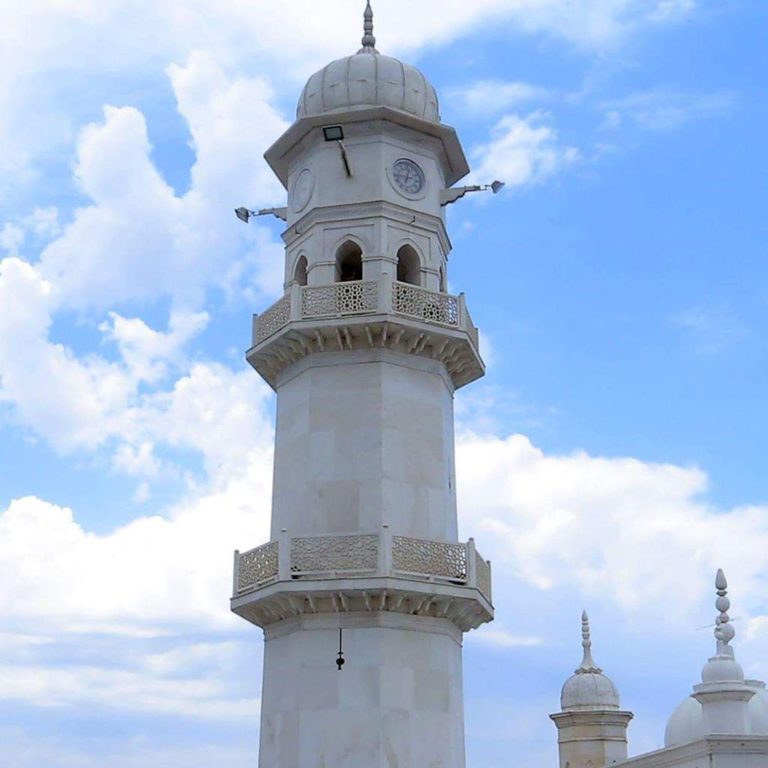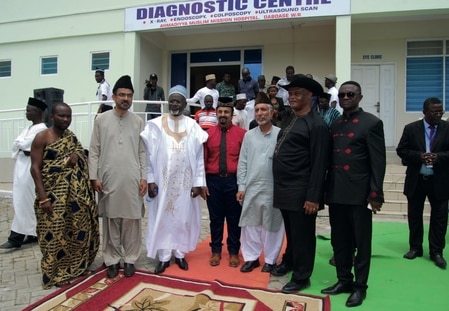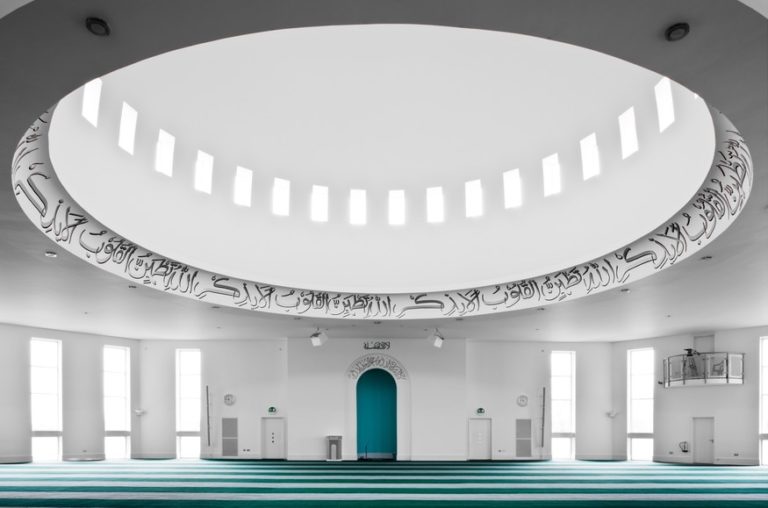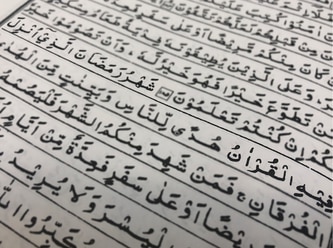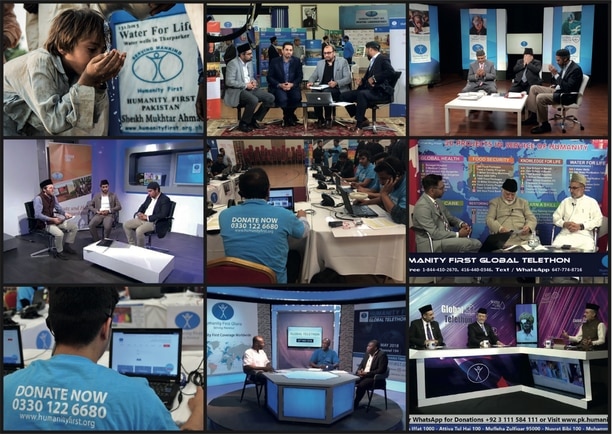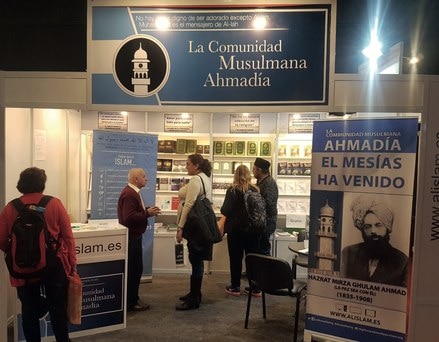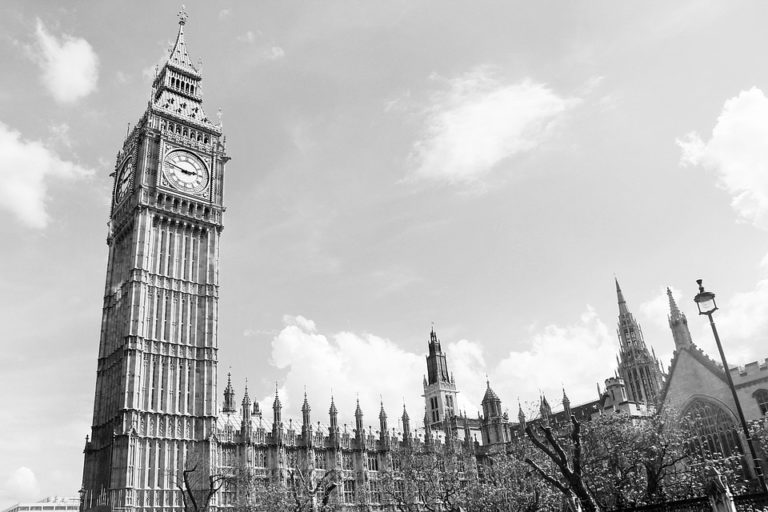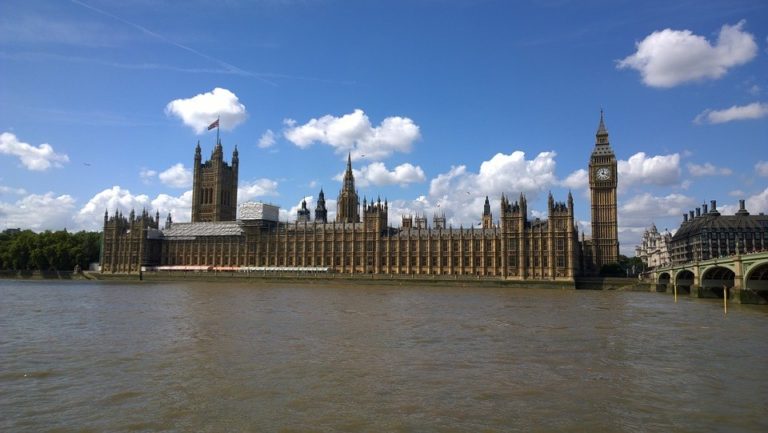Friday Sermon
4 May 2018
Men of Excellence: Hamza ibn Abdul Muttalibra
After reciting the Tashahhud, Ta‘awuz, and Surah Al-Fatihah, Hazrat Khalifatul Masih Vaa stated:
The Promised Messiahas stated at one occasion, “What was the condition of the civility, morals and spirituality of the Arab nation at the time of the advent of Holy Prophetsa? Civil unrest was rampant; drinking, adultery and looting were common. In short, every vice was rife. Nobody had any relation to God Almighty or displayed any moral excellence. Everyone thought themselves to be the pharaoh. However, upon the advent of the Holy Prophetsa, once they entered into the fold of Islam, they developed such Divine love and a spirit of unity that every one of them became ready to die in the way of God Almighty. They manifested the true essence of bai’at [oath of initiation] which they reflected through their actions.”
The Promised Messiahas further stated, “The Companions of the Holy Prophetsa exhibited such an example of loyalty, which had no parallel before, nor will we see any parallel in the future… However, if God Almighty so desires, He can make this happen once again. Others can derive benefit from their examples. God Almighty can establish such examples in this Community.” The Promised Messiahas is referring to his own Community.
He further stated that, “What beautiful words has God Almighty, uttered in praise of the Companions of the Holy Prophetsa:
مِنَ الْمُؤْمِنِيۡنَ رِجَالٌ صَدَقُوۡا مَا عَاهَدُوا اللّٰهَ عَلَيۡهِ ۚ فَمِنْهُمۡ مَّنۡ قَضٰي نَحْبَهٗ وَ مِنْهُمۡ مَّنۡ يَّنۡتَظِرُ
‘Among the believers are men who have been true to the covenant they made with God Almighty. There are some of them who have sacrificed their lives, and some who are still waiting, ever-ready to sacrifice their lives.’ (Chapter 33:24)
The Promised Messiahas then states, “There can be no greater role models for us if we were to see all the verses of the Holy Quran in praise of the Companions.” (Malfuzat, Vol. 7, pp.431-433, 1985, UK)
That is, no other verse depicts the great model of the Companions than the one mentioned. Thus, these examples of righteous deeds and sacrifices are a blessed and excellent example for us all.
For some time, in my sermons, I have been narrating the incidents from the lives of the Companions that included the Badri Companions [those who participated in the Battle of Badr] and some others as well. However, at first, I thought that I should only speak on those Companions, who participated in the Battle of Badr for they had a special rank. These were the people, with whom Allah the Exalted was pleased, and they attained His pleasure.
Today, I will speak about Hazrat Hamzara bin Abdul Muttalib. A detailed account of him, in particular the way he converted to Islam, has been given in history and in the Ahadith. The same is true for the incident of his martyrdom. He was known by the title of Sayyidush-Shuhadaa [The Chief of the Martyrs]. Asadullah [The Lion of Allah] and Asadur-Rasul [The Lion of the Prophet] were accolades also given to him.
Hazrat Hamzara was the son of Hazrat Abdul Muttalib, the leader of the Quraish and the paternal uncle of the Messenger of Allahsa. The name of the mother of Hazrat Hamzara was Hallah, who was also the paternal cousin of the Prophet’s mother, Hazrat Aminah. Hazrat Hamzara was two years older than the Holy Prophetsa or four years according to another narration. (Isti‘ab, Vol. 1, p.369, Hamza bin Abdil-Muttalib, Darul Jalil, 1992, Beirut), (Usdul Ghaaba, Vol. 2, p.67, Hamza bin Abdil-Muttalib, Darul-Kutub Al-‘Ilmiyyah, 1996, Beirut)
Hazrat Hamzara was also a foster brother of the Holy Prophetsa. A bondwoman, named Thaubia, had nursed both of them. (Sharah Zarqani, Vol. 4, p.499, Bab Zikru Munaqibul Abbas, Darul-Kutub Al-‘Ilmiyyah, 1996, Beirut)
Hazrat Hamzara was enabled to accept Islam in the sixth nabawi year, during the period of [the stay at] Darul Arqam. (At-Tabaqat Al-Kubra Li Ibn Sa‘d, Vol. 3, p.6, Hamza bin Abdil Muttalib, Darul-Kutub Al-‘Ilmiyyah, 1990, Beirut)
In accordance with historical accounts, Hazrat Musleh-e-Maudra has narrated the incident of Hazrat Hamza’s acceptance of Islam in his own style. I will narrate its summary [before you] as well as present some of its details. A person ought to hear this incident and ponder over the reasons as to why Hazrat Hamzara accepted Islam, and how he was overcome with jealousy for the honour of the Holy Prophetsa at the time when Abu Jahl acted unjustly toward the Prophetsa.
Nevertheless, this incident is narrated as follows: Once, the Holy Prophetsa was sitting on a rock between the hills of Safa and Marwa. He was most certainly pondering over how to establish the unity of God Almighty in the world when, in the meanwhile, Abu Jahl approached him. As soon as he arrived, he said, “O Muhammadsa! Why do you not refrain from spreading your message?” Following this statement, Abu Jahl began to verbally abuse the Prophet in a most vile manner. The Holy Prophetsa quietly continued to listen to Abu Jahl’s abuse and tolerated him. He did not utter a single word in reply. After Abu Jahl had finished uttering these words of abuse, this wretched person came forward and slapped the Holy Prophetsa on his face. However, even then, the Prophet did not say a word to him. Hazrat Hamza’s house was right in front of the place where the Holy Prophetsa was sitting and where Abu Jahl had abused him. Hazrat Hamzara had not yet accepted [the Prophetsa] by then. His daily routine was that he would take his bow and arrow and go hunting every morning and return in the evening. Furthermore, he would participate in the gatherings of Quraish.
That day, when Abu Jahl had cursed the Holy Prophetsa and treated him harshly, he was away hunting. However, it so happened that when Abu Jahl was acting in this manner, one of the female servants of Hazrat Hamzara was standing at the door, observing this scene. When Abu Jahl repeatedly attacked the Holy Prophetsa and hurled innumerable curses at him, the Prophet quietly and peacefully tolerated his abuse. The female servant stood at the door and continued to observe this scene. Hazrat Musleh-e-Maudra writes that that was undoubtedly a woman and a disbeliever. However, in the older times, whereas the people of Mecca inflicted cruelties upon their slaves, there were also some noble people, who treated their slaves with kindness, and after a long period of time, those slaves were considered a part of that very family. The same was the case for this female slave of Hazrat Hamzara. When she observed this entire scene with her eyes and heard it with her ears, it impacted her greatly. However, she was unable to do anything. She continued to observe and hear, however, she became distressed and was burning with rage from within. When the Holy Prophetsa got up and left that place, she also returned to her work.
When Hazrat Hamzara returned from his hunt that evening and came home, he disembarked from his mount with his bow and arrow in hand, in a manner of demonstrating his courage and pride. Seeing this, the female servant, who had supressed her anger and sorrow for a long time, approached Hazrat Hamzara and passionately said, “Do you have no shame that you walk around acting brave?” Hearing this, Hazrat Hamzara became perplexed and asked her in astonishment what the matter was. The female servant said, “The matter is that your nephew, Muhammadsa, was sitting here when Abu Jahl approached him, and began to attack and hurl abuse at him, and then Abu Jahl slapped him on the face. However, Muhammadsa did not make as much as a sound in response to this and quietly continued to bear this. Abu Jahl continued to curse him until he became tired and then left. However, I saw that Muhammadsa did not respond to any of his actions. You walk around with great courage and have returned from your hunt with great pride. Are you not ashamed that your nephew has been treated in this manner in your presence?”
Hazrat Hamzara had not yet accepted Islam. One of the reasons for this was that he was counted among the leaders of Quraish and he was also not willing to accept Islam due to [his] position in the tribe, even though he believed the Prophetsa to be true. However, until that time, Hazrat Hamzara was unprepared to sacrifice his status, honour and prominence for the sake of religion. Nevertheless, when he heard this incident from his female slave, his eyes became bloodshot and he became indignant for his family’s honour. Hence, without taking a moment of rest, he marched toward the Ka‘ba in that very state of anger. First, he performed a circuit around the Ka‘ba and following this he marched towards the gathering in which Abu Jahl was present.
There, Abu Jahl was narrating the incident with great arrogance, pride and boastfulness. He mentioned that earlier that day he had abused Muhammadsa and treated him in a vile manner. When Hazrat Hamzara reached this gathering, he forcefully struck his bow against the head of Abu Jahl and said, “You claim to be brave and are telling people that you disgraced Muhammadsa in such manner and that he did not make as much as a sound. Now I will disgrace you. If you have the courage, speak before me.” At that time, Abu Jahl was considered to be a king and he was a chief of [their] nation. He was similar to the pharaoh. When his friends saw this, they passionately got up and tried to attack Hazrat Hamzara. However, Abu Jahl, who had become awestruck due to the Holy Prophetsa quietly tolerating his abuse and due to the bravery and courage of Hazrat Hamzara, intervened and stopped them from attacking Hazrat Hamzara. He said, “Let him be. The fact of the matter is that I committed an injustice and Hamza is in the right.”
Hazrat Musleh-e-Maudra further writes in his own manner that when Muhammadsa returned home from the hills of Safa and Marwa, he was repeating in his heart that his duty was not to fight, but to patiently tolerate all abuse. However, God Almighty from His throne was declaring
اَلَيْسَ اللهُ بِكَافٍ عَبْدُهُ
In other words, “O Muhammadsa! You are not prepared to fight, however, are We not present in order to overcome the opponents on your behalf?”
Hence, the very same day, God Almighty endowed the Holy Prophetsa with a devoted soul in order to confront Abu Jahl. Furthermore, Hazrat Hamzara professed his belief in the very gathering in which he struck his bow against the head of Abu Jahl. He addressed Abu Jahl and said, “You abuse Muhammadsa merely because he says that he is the Messenger of God and that angels descend upon him. Listen carefully that from today, I also follow the religion of Muhammadsa, and I also profess all that which Muhammadsa professes. If you have the courage and dare, then confront me.” Having said this, Hazrat Hamzara entered the fold of Islam. (Rasul-i-Karim ki zindagi ke tamaam aham waqiaat… Anwarul Uloom, Vol. 19, pp. 137-139)
In the narrations we find that after Hazrat Hamzara accepted Islam, it strengthened the faith of the Muslims in Mecca. (At-Tabaqat Al-Kubra Li Ibn Sa‘d, Vol. 3, p.6, Hamza bin Abdil Muttalib, Darul-Kutub Al-‘Ilmiyyah, 1990, Beirut)
In fact, the English historian, Sir William Muir, has also testified to this fact that the objective of the Holy Prophetsa was strengthened by Hazrat Hamzara and Hazrat Umarra entering the fold of Islam. (The Life of Mohammad, Sir William Muir, Heading – Prophet Insulted, p. 89, 1923)
Along with other Muslims, Hazrat Hamzara also migrated to Medina and stayed at the home of Hazrat Kulthumra bin Al-Hidm. In accordance with another narration, he stayed at the home of Hazrat Sa‘dra bin Khaithimah. Nevertheless, following the migration, the Holy Prophetsa formed a bond of brotherhood between Hazrat Hamzara and Hazrat Zaidra bin Harithah. On this very basis, Hazrat Hamzara made a will in the name of Hazrat Zaidra while they were on their way to participate in the Battle of Uhud. (At-Tabaqat Al-Kubra Li Ibn Sa‘d, Vol. 3, p.6, Hamza bin Abdil Muttalib, Darul-Kutub Al-‘Ilmiyyah, 1990, Beirut)
Even after the migration to Medina, the mischief of the disbelievers did not come to an end. Their misconduct towards the Muslims did not cease to exist. For this reason, the Muslims had to remain alert and be vigilant of the movement of the disbelievers. In a narration we find that in order to remain vigilant of the movement and mischief of the Quraish, the Holy Prophetsa was in need of [appointing and sending] expeditions, in which Hazrat Hamzara was enabled to serve in an extraordinary manner. In Rabi’-ul-Awwal [Islamic month], in the second year after the migration, the Holy Prophetsa sent an expedition of thirty Muhajireen [migrants to Medina] riding on camels, in the leadership of Hazrat Hamzara towards ‘Eeas. Hazrat Hamzara and his companions swiftly reached this place, upon which they saw that the leading chief of Mecca, Abu Jahl, was present in order to welcome them with an army of three hundred men riding on horses and camels. This was ten times the size of the Muslim expedition. However, the Muslims had left their homes in compliance with the command of Allah and His Messengersa and the fear of death could not hold them back. Both [armies] stood face to face to one another and they lined up in rows. They were on the brink of engaging in battle when the chief of that area, Majdi bin ‘Amr Al-Juhni, who had a relationship with both parties, intervened and stopped the fight just as it was about to erupt. (Sirat Khatam-un-Nabiyyeen, Hazrat Mirza Bashir Ahmad Sahib M.A., p. 329)
There is also a tradition that the Holy Prophetsa had given Islam’s first flag to Hazrat Hamzara, but there are other traditions that the expeditions led by Hazrat Abu Ubaidahra and Hazrat Hamzara were sent simultaneously, which castes some doubt over it. In any case it is established that Hazrat Hamzara was the standard bearer of the Holy Prophetsa in the Battle of Banu Qainuqah in 2 Hijrah. (Sirat Ibn-e-Hisham, p. 283, Bab Sariyatu Hamza, Daru Ibn Hazm, 2009, Beirut)
Hazrat Hamzara always followed the instruction of the Holy Prophetsa that one should always preserve one’s dignity and self-respect. There is a tradition that after the migration to Medina, Hazrat Hamzara had suffered a great financial loss like other Muslims. Hazrat Abdullah bin ‘Amrra narrates that during those days, Hazrat Hamzara once came to the Holy Prophetsa and asked if he could perform any service so that it could be a source of income for him. The Holy Prophetsa replied, “O Hamza! Is it preferable to keep one’s self-respect or to completely lose it?” Hazrat Hamzara said that he wished to keep his self-respect. The Holy Prophetsa then said, “You ought to safeguard your dignity”. (Musnad Ahmad bin Hanbal, Vol. 2, p. 624, Hadith No. 6639, A’alamul Kutub, 1998, Beirut)
The Holy Prophetsa then asked him to pray more fervently and taught him some particular words of prayers. Hazrat Hamzara said that the Holy Prophetsa had told him that he should recite the following prayer,
اَللّٰهمَّ اِنِّيْ اَسْـَٔلُكَ بِاسْمِكَ الْاَعْظَمِ وَ رِضْوَانِكَ الْاَكْبَر
“O Allah I beseech Thee, with reference to Your Great Name and the Great Gatekeeper of Paradise”, which he always benefited from.
These things tell us that Hazrat Hamzara had deep faith in prayer, and why would he not as it was through these prayers that Allah the Exalted had given this impoverished emigrant all the household things and whatever else he needed. Sometime later he married Khola bint Qaisra, who was an Ansari lady from Bani Najjar. The Holy Prophetsa would visit their home. Hazrat Kholara would narrate the loving accounts from that time of the Prophetsa. She would say that once the Holy Prophetsa visited their home and she asked him, “O Messenger of Allah, I have heard that you have said that on the Day of Judgement you will be given the heavenly fountain of Kauthar, and that this will be vast”. The Holy Prophetsa said “Yes, this is true, and listen, I would prefer your kindred, the Ansar, to drink from it much more than others.” (Musnad Ahmad bin Hanbal, Vol. 8, p. 822, Hadith No. 27859, A’alamul Kutub, 1998, Beirut) This is the love he had for the Ansar, due to the fact that when he had been expelled from Mecca by his own people, it was the Ansar who had given him all they had.
In the history of the Battle of Badr in 2 AH, we find a famous incident that took place. One of the disbelievers, Aswad bin Abdul Asad Makhzoomi, who was a very nasty and horrible man came forward. He had sworn that he would either drink from the well of the Holy Prophetsa and the Muslims, or demolish it or desecrate it, or else would die nearby trying to achieve this goal. When he arrived there, he was challenged by Hazrat Hamzara bin Abdul Muttalib. Hamzara attacked him with his sword and cut through half of his calf. He was close to the well and fell on his back. He tried to get nearer to the well in order to fulfil his oath. Hazrat Hamzara followed him and finished him off by attacking him again. Aswad died close to the well but was unable to drink from it or spoil it in any way. (Sirat Ibn-e-Hisham, pp.298-299, Bab Maqtal Al Aswad bin Abdul Asad, Daru Ibn Hazm, 2009, Beirut)
Hazrat Alira states regarding the Battle of Badr that the number of disbelievers was many times greater than that of Muslims. The Holy Prophetsa spent the entire night praying with deep yearning and great humility. When the army of disbelievers came close and the Muslims took their positions, they saw a man on a red camel and he was moving among the ranks. The Holy Prophetsa asked Alira to check with Hamzara, who that man was, as Hamzara was closer to the opposition army. Then the Holy Prophetsa said, “If there is anyone among the disbelievers who can admonish them, it is that man on the red camel”. Meanwhile Hazrat Hamzara came and said that it was Utba bin Rabi‘ah who was trying to persuade the disbelievers from engaging in battle, but Abu Jahl had taunted him for being a coward and fearing war. Upon hearing this taunt, Utba had become charged and had said, “We will see who is a coward”. (Musnad Ahmad bin Hanbal, Vol. 1, pp. 338-339, Hadith No. 948, A’alamul Kutub, 1998, Beirut)
Hazrat Alira narrates, “Utba bin Rabi‘ah came forward to fight along with his son and brother, and challenged anyone to a fight. Many Ansari young men accepted this challenge. Utba then asked them who they were and when they said they were from among the Ansar, he said that they did not have any quarrel with them. They only wished to fight their uncles’ sons. Upon hearing this the Holy Prophetsa said, “O Hamza, arise! O Ali, stand up! O Abu Ubaida bin Harith, step forward!” Hazrat Alira says, “Hamzara went toward Utba, and I went toward Shaibah, and Abu Ubaida contested with Waleed and they both injured each other severely. Both Hazrat Hamzara and I then turned towards Waleed and killed him. We then brought Abu Ubaidara back from the battlefield”. (Sunan Abu Daud, Kitabul Jihad, Bab Fil Mubarizah, Hadith No. 2665)
Hazrat Alira and Hazrat Hamzara had killed their rivals. When the Holy Prophetsa had called all three to march forward and fight, when approaching their enemies, Utbah said for them to say something so that they could be recognised as they were wearing helmets that covered their faces. Upon this Hazrat Hamzara said, “I am Hamzara. I am the Lion of Allah and His Messenger”. Utba responded, “What a worthy rival”. (At-Tabaqat Al-Kubra Li Ibn Sa‘d, Vol. 2, p.12, Hamza bin Abdil Muttalib, Darul-Kutub Al-‘Ilmiyyah, 1990, Beirut)
Hazrat Hamzara was so brave that he had an ostrich feather placed as a sign of battle to awestrike the disbelievers. Hazrat Abdur Rahman bin Aufra narrates that Umayya bin Khalf, who was amongst the chieftains of the Quraish, the man who would torture Hazrat Bilalra in Mecca, was killed at the hands of the Ansar in Badr. He had asked Abdur Rahman, “Who is the man with the ostrich feather on his chest”? Hazrat Abdur Rahman informed him that it was Hazrat Hamzara bin Abdul Muttalib. Umayyah said, that it was Hamza that had caused the most harm to them that day. (Sirat Ibn-e-Hisham, p. 302, Bab Maqtal Umayya bin Khalf, Daru Ibn Hazm, 2009, Beirut)
The English historian Sir William Muir writes about the participation of Hazrat Hamzara in the Battle of Badr, that Hazrat Hamzara was visibly prominent across the battlefield as he was wearing the feather of an ostrich. (The Life of Mohammad, Sir William Muir, Heading – Battle of Ohod [sic], p. 260, 1923)
During the battle, he valiantly killed many leaders. During the Battle of Uhud, Hazrat Hamzara also proved his excellence in gallantry. This display of bravery was a thorn in the sight of the Quraish of Mecca. Details of this event are recorded in Bukhari is as follows:
Hazrat Ja‘far bin ‘Amr bin Umayya Zamrira narrates, “I was travelling with Ubaidullah bin Adi bin Khiyarra when we arrived at Homs, which is a famous city in Syria. Once we reached there Ubaidullah bin Adira said to me, ‘Would you like to meet Wahshi bin Harb of Abyssinia. We will ask him about the murder of Hazrat Hamzara.’ Wahshi used to live in Homs. Therefore, we enquired about his address and we were told that Wahshi is sitting idle under the shade of his palace.”
Ja‘far says, “We went to Wahshi and stood by him for a short while. We offered the greetings of peace, to which he replied in kind.” Ja‘far said, “Ubaidullah at the time was wearing a turban. His head and face were covered. Wahshi could only see his eyes and feet. Ubaidullah said to Wahshi if he could recognise him? Wahshi looked at Ubaidullah carefully and then replied, ‘By God, I do not recognise you except that I know that Adiyy bin Khiyar married a woman called Ummul Qital bint Abi Lais. They had a child in Mecca. I would feed this baby and carry him to the mother and would hand him over to her. I used to see the feet of this child, and by looking at your feet today, I have a feeling you are the very same person.’”
On hearing this Ubaidullah revealed his face. (So Wahshi recognised Ubaidullah from his feet). Then Ubaidullah said to Wahshi to narrate the incident of the murder of Hamzara. Wahshi explained that Hazrat Hamzara had killed Tu‘aimah bin Adiyy bin Khiyar during the battle of Badr. Wahshi’s master at the time Jubair bin Mut‘am had said to him that if he could avenge the murder of his uncle Tu‘aimah by killing Hamzara, and in return he will be set free. Wahshi then said that when people saw that the Battle of Uhud was to commence, and they were heading towards ‘Ainain, one of the hills of Uhud. There was a valley between this hill and Uhud. Wahshi also joined the expedition here. When people lined up to begin the battle, Siba‘ came forward and called out if anyone dared challenge him. On hearing this Hazrat Hamza bin Abdul Muttalibra stepped forward and said, “O Siba‘, do you war with Allah and His Messengersa”. After saying this, Hazrat Hamzara attacked him and slayed him as if he had not existed from before. (This means that he swiftly overpowered Siba‘ and dealt with him.) Wahshi says that he was hiding behind a large stone waiting to ambush Hazrat Hamzara. When Hazrat Hamzara came near him, he attacked him with his spear and impaled him with it, penetrating his torso. These were Hazrat Hamza’s last moments. When people returned to Mecca, Wahshi also returned with them and stayed in Mecca until the people of Mecca accepted Islam, at which he then migrated to Taif. People sent ambassadors to the Holy Prophetsa and Wahshi was asked as to why he would not go with those ambassadors, as they could not be harmed in any way. So, Wahshi also joined them, and when he went to see the Holy Prophetsa, as soon as the Prophet saw him, he asked, “Are you the one they refer to as Wahshi?” Wahshi responded in the affirmative. The Holy Prophetsa asked if he was the one that killed Hamzara. Wahshi said that the Prophet had been correctly informed. At this, the Holy Prophetsa said, “As much as possible do not come before me.” Wahshi says that on hearing this he left this place.
When the Holy Prophetsa passed away and Musailimah Kadhdhab started a rebellion, Wahshi thought that he ought to go to Musailimah, and if he was the one to kill him, then this may serve as an atonement for the killing of Hazrat Hamzara. Wahshi says that he too set out for the war with the people and the battle panned out as it did. He saw that a man was stood in the gap of a wall. This man’s complexion resembled that of a wheat coloured camel. He was so dishevelled, and his hair was scruffy. So, Wahshi continued that he attacked this man with his spear by striking him on his chest which impaled him between the shoulders, and then an Ansari cut the man’s throat. So, this was his ending at last. (Sahih Al Bukhari, Kitabul Mughazi, Bab Qatli Hamza bin Abdul Muttalib, Hadith No.4072)
Umair bin Ishaq narrates that on the day of Uhud, Hamzara bin Abdul Muttalib was fighting in front of the Holy Prophetsa with two swords. He was chanting that he was the Lion of God. During this chant he would move forward and backward. Whilst doing this his foot slipped and he ended up falling on his back. Wahshi Aswad saw him in this state. Abu Usama narrates that Wahshi attacked him with his spear and murdered Hamza. (At-Tabaqat Al-Kubra Li Ibn Sa‘d, Vol. 3, p.8, Hamza bin Abdil Muttalib, Darul-Kutub Al-‘Ilmiyyah, 1990, Beirut)
Hazrat Hamzara was martyred during the Battle of Uhud, 32 months after the migration of the Prophetsa to Medina. At the time, his age was 59 years. (At-Tabaqat Al-Kubra Li Ibn Sa‘d, Vol. 3, p.6, Hamza bin Abdil Muttalib, Darul-Kutub Al-‘Ilmiyyah, 1990, Beirut)
It is narrated that Hind, who was the wife of Abu Sufiyan, also was present with the army of the disbelievers on the day of Uhud. She wanted to avenge the death of her father, who was killed while fighting Hazrat Hamzara during the Battle of Badr. She had sworn that whenever the opportunity arose she would chew the liver of Hamzara. When such a situation did arise and Hazrat Hamzara fell, the disbelievers dismembered the bodies of the martyred Muslims, defaced them and cut their noses and ears. They also cut out a part of the liver of Hazrat Hamzara and gave this to Hind. Hind attempted to chew upon this liver but was unable to swallow it, so she spat it out. When this incident came to the knowledge of the Holy Prophetsa, he said that Allah Almighty had forbidden the fire to ever touch any part of the body of Hamzara. (At-Tabaqat Al-Kubra Li Ibn Sa‘d, Vol. 3, p.8, Hamza bin Abdil Muttalib, Darul-Kutub Al-‘Ilmiyyah, 1990, Beirut)
Then the Holy Prophetsa went to the body of Hazrat Hamzara. It is narrated that the Prophetsa expressed such sentiment and gave the glad tiding of high status to Hazrat Hamzara in the following way:
When the Prophetsa visited the body of Hazrat Hamzara and saw that his liver had been cut out and chewed, Ibn Hisham records this in his biography of the Prophetsa that the Holy Prophetsa stood by the body of Hazrat Hamzara and said, “O Hamza, no trial like this (i.e. your demise) will I ever face again. I have never seen a more painful scene till today.” Then, the Holy Prophetsa said, “Angel Gabriel has given me the tiding that Hamza bin Abdul Muttalib has been noted as the Lion of the Prophet in the seven heavens.” (Sirat Ibn-e-Hisham, p.395, Bab Sariyatu Hamzah, Daru Ibn Hazm, 2009, Beirut)
Hazrat Zubairra narrates that it was the day of the Battle of Uhud, and near the end of the expedition, a woman was seen running towards the battlefield. It was well-nigh that she would see the bodies of the martyrs. The Holy Prophetsa did not desire for women to go there and witness the disfigured bodies of the Companions. For this reason, he stopped the woman. Hazrat Zubairra narrates, “After observing carefully I noticed that the woman was my mother Hazrat Safiyyahra. Hence, I went running toward her, and before she could reach the bodies of the martyrs I caught up with her. When she saw me, she pushed me aside by the chest. She was a strong woman. She said for me to move aside and that she would not listen to anything I had to say. I informed her that the Holy Prophetsa told me to stop her from seeing the corpses. When she heard this she immediately stopped and took out two white pieces of cloth. She told me that she had brought these white cloths for her brother Hamzara as she had been informed of his martyrdom.”
Hence, this was the obedience of the people in that era that as soon as they heard an instruction of the Holy Prophetsa, in spite of all her anguish and despite her eagerness, she immediately controlled her emotions and stopped when the Holy Prophet’ssa instruction was mentioned. This is absolute obedience.
Hazrat Safiyyahra then said, “I have brought these whites cloths for my brother Hamzara as I have been informed of his martyrdom, so go and shroud him in these.” Hazrat Zubairra says, “When we were about to shroud Hazrat Hamzara in these two cloths, we saw an Ansari companion lying beside Hazrat Hamzara, who had also been martyred and his body was also disfigured in the same manner as Hazrat Hamzara. We felt guilty to shroud Hazrat Hamzara in two cloths whereas this Ansari companion had no cloth at all, therefore we decided to wrap Hazrat Hamzara in one cloth and the Ansari Companion in the other. We realised that one companion was taller than the other, so we drew lots to see who would be buried in which cloth. (Musnad Ahmad bin Hanbal, Vol. 1, p. 452, Hadith No. 1418, A’alamul Kutub, 1998, Beirut)
Hazrat Hamzara was shrouded in one cloth. When his face was covered, his feet went bare, and when the cloth was drawn down to his feet, his face would become bare. At this the Holy Prophetsa instructed for his face to be covered with the cloth, and for his feet to be covered with lemongrass. Hazrat Hamzara and Hazrat Abdullah bin Jahshra, who was his nephew, were buried in the same grave. At this occasion the Holy Prophetsa first of all led the funeral prayer of Hazrat Hamzara. (At-Tabaqat Al-Kubra Li Ibn Sa‘d, Vol. 3, p.6-7, Hamza bin Abdil Muttalib, Darul-Kutub Al-‘Ilmiyyah, 1990, Beirut), (Musnad Ahmad bin Hanbal, Vol. 7, p. 72, Hadith No. 21387, A’alamul Kutub, 1998, Beirut)
Hazrat Abdullah bin Masoodra narrates that the Holy Prophetsa led the funeral prayer of Hazrat Hamzara with his body present before him. The body of an Ansari companion was placed next to his, then he led their funeral prayer. Then the body of this Ansari companion as taken away and Hazrat Hamza’s body was left there. The Holy Prophetsa led the funeral prayer of Hazrat Hamzara seventy times that same day as every time, another companion’s body was brought before him and placed next to that of Hazrat Hamzara. (At-Tabaqat Al-Kubra Li Ibn Sa‘d, Vol. 3, p.11, Hamza bin Abdil Muttalib, Darul-Kutub Al-‘Ilmiyyah, 1990, Beirut)
Hazrat Abu Hurairahra narrates that Hazrat Hamzara was always at the forefront in good treatment to his relatives and carrying out good deeds. After his martyrdom, the Holy Prophetsa addressed his body and said, “May the mercy of Allah be upon you. It seems that there is no other like you in reconciling and performing virtuous deeds. After today there shall be no more grief for you.”
The Companions narrate the impoverished times during the burial of Hazrat Hamzara, the uncle of the Holy Prophetsa and a brave leader of the Muslims, with great sorrow.
Later on, in the time of prosperity, Hazrat Khababra would describe those days of hardship saying that Hazrat Hamzara was buried in a single cloth that was unable to fully cover him. Hence, his face was covered and grass was placed over his feet. (Musnad Ahmad bin Hanbal, Vol. 7, pp. 71-72, Hadith No. 21387, A’alamul Kutub, 1998, Beirut)
Likewise, there is also the similar incident of Hazrat Abdur Rahman bin Aufra. Once he was fasting and at the time of the breaking of the fast he was presented extravagant food. When he saw this he recalled the days of hardship. He said, “Hamza was martyred and he was better than I. We did not even have a full cloth to shroud his body. Then we were granted the prosperity of the world, and were endowed whatever we desired. We fear lest we have been rewarded in this life for the deeds we have carried out.” In other words, “We have received all our rewards in this life.” He then began weeping, so much so that he left his food. (Sahih Al Bukhari, Kitabul Maghazi, Ghazwah Uhud, Hadith No. 4045)
These were the people with whom Allah Almighty was pleased and who were pleased with Him. In times of prosperity they remembered their brothers, and kept in mind their previous state. Allah Almighty has given them all glad tidings of paradise. May Allah continue to elevate their rank.
In another narration by Hazrat Abdullah bin Umarra it is said that when the Holy Prophetsa returned from Uhud he heard that the wives of the Ansar were crying and lamenting over their husbands. The Holy Prophetsa said, “What is the matter that no one weeps over the martyrdom of Hamza.” When the Ansari women became aware of this, they gathered together to mourn the martyrdom of Hazrat Hamzara. Then the Holy Prophetsa fell asleep. When he woke up he saw that the women were still weeping in the same manner. The Holy Prophetsa said, “Would they continue to weep the entire day in the name of Hamza? Tell them to return to their homes.” It was then that the Holy Prophetsa instructed them to go to their homes, and from this onward no one shall lament and wail over the death of a departed one. (Musnad Ahmad bin Hanbal, Vol. 2, pp. 418-419, Hadith No. 5563, A’alamul Kutub, 1998, Beirut)
In this manner the Holy Prophetsa declared it unlawful to lament and wail over the deceased. The Holy Prophetsa used great wisdom in dealing with the sentiments of the women of the Ansar. Instead of them lamenting the loss of their husbands and brothers, the Holy Prophetsa drew their attention towards Hazrat Hamzara, which was a great loss to the entire Muslim population and, most of all, to the Holy Prophetsa.Then he advised them not to lament and wail over Hazrat Hamzara by presenting his own example. He admonished them to display patience in a manner that left a lasting impression. As for the loss of Hazrat Hamzara, the Holy Prophetsa felt it until the very end of his life.
Ka‘b bin Malik wrote a eulogy at the martyrdom of Hazrat Hamzara in which he says that his eyes shed tears irrepressibly at the loss of Hazrat Hamzara, and indeed it is appropriate to mourn his loss; but what good will come from shrieking, crying and wailing over his loss, for the morning on which the Lion of God was martyred, the world said, a martyr indeed is this valiant one, if there was ever a martyr.
May Allah Almighty continue to elevate the status of these Companionsra. May the Muslim world remember the sacrifices offered by these Companionsra until the Day of Judgement, and may we have the opportunity to act on the virtues and examples they demonstrated for us.
(Translated by The Review of Religions)





